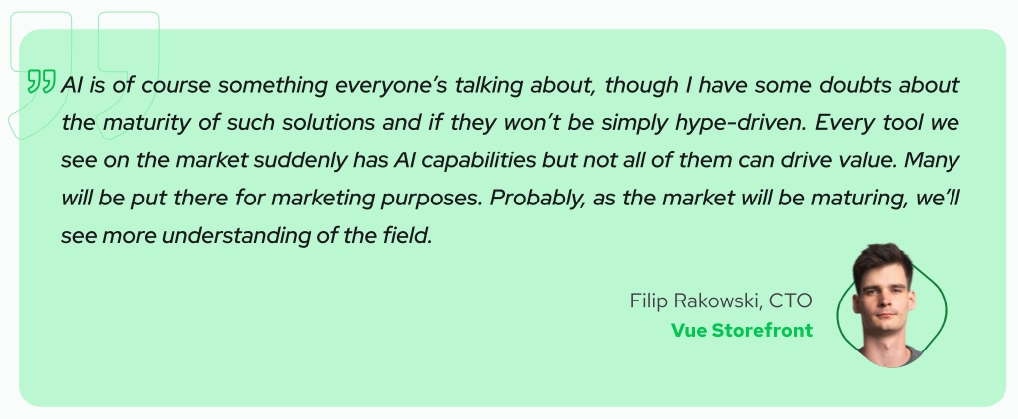Explore by Category:
Headless Commerce
Retailer’s Guide to Composable Commerce in 2024: Market Trends and Expert Forecast
Replacing your legacy stack with a composable model is not an easy decision. Especially if the economy is down, the prices go up, and competition is on your heels.
We’ve put together a comprehensive report on the state of the composable commerce market , featuring the latest industry trends and expert opinions on what to expect this year and if 2024 is to be the year you embrace modularity.
This post is a condensed version of the report.
Here are 5 trends that will define the composable landscape this year:
- AI is changing the way we think of digital commerce
- The growing need for API-first integrations is here to stay
- Effective data orchestration is to redefine eCommerce personalization
- The emergence of composable stack marketplaces
- A new approach to modernization in the old economy
1. AI is about to change the way we perceive digital commerce. Soon.
Let's start with the elephant in the room. Just like ChatGPT has forever transformed the way we think of marketing (and doing grocery lists) last year, similar Large Language Models (LLMs) are likely to change digital retail as we know it, too.
And it’s bound to happen sooner rather than later.
The good news: Integrating AI-based solutions in your composable stack is expected to significantly increase your revenue.
The slightly-worse news: We’re not quite there yet.

And while it’s certainly true, it doesn’t mean we can’t get excited about the small things that are readily available, such as:
Significant improvements in the performance of conversation bots;
Popularization of AI-optimized content;
Growing demand for voice and visual search to accommodate digital assistants.
So the big thing for 2024 is not just to use AI for your eCommerce operations but to keep in mind that right now, everyone is experimenting with AI on their own.
Your task is to figure out how to get ChatGPT to recommend your store in its next reply to the person searching for the best jacket for their brother’s Bar Mitzvah. Not how many LLMs your target audience should get through before reaching a real-life customer support representative.
2. API-first integrations of the best-of-breed solutions are here to stay
API-first integrations are becoming increasingly important, offering flexibility and efficient integration of diverse systems. As the backbone of a composable approach, API-first suggests that retailers should rely on an array of third-party integrations rather than developing their own monolith architecture.
Some of the benefits of this approach include:
Greater control and flexibility over various components of your online platforms;
Improved customer experience;
Higher security and compliance with customer data protection protocols;
Reduced likelihood of system failures;
Better agility and scalability of your operations.
A clear focus on the API first approach seems to be the right way. Every legacy system is different. There are still legacy technologies out there that were implemented before the existence of the internet (e.g. legacy ERP systems). Therefore, integrating what is possible and creating abstraction layers for very old legacy systems seems to be the way forward.
– Manuel Toenz, Bloomreach
3. An even greater emphasis on “personal” with enhanced data orchestration
Data orchestration plays a critical role in delivering personalized customer experiences in digital retail.
It is how the brand collects, aggregates, and analyzes all the customer data coming from various sources that defines its ability to deliver personalized offers. As multichannel brand presence is no longer a competitive advantage but an expected service, finding technologies that would allow you to draw better conclusions from a variety of data points can help you facilitate matching the right product to the right customer.
However, it’s important to pay special attention to data orchestration in the API-first world. Not only are you gathering information from different channels, you are also tapping into data points from third-party services.
Betting on a powerful analytics engine that can integrate with all of your solution vendors and provide conclusive insights will be essential.
4. Dedicated composable stack marketplaces to facilitate components’ management
The demand for composable technology is there, and we have statistics to prove it – the headless commerce sector alone is expected to reach $32.1 billion at CAGR by 2027. However, this growing need also poses some serious questions, namely associated with the concern regarding the management of complex modular architectures.
One of the undeniable perks of monolith architecture is the enhanced sense of control. Composability, in turn, is often associated with much more complex support systems and robust backends.
Experts believe that as soon as this year, we are bound to see an emergence of the “composable marketplaces” that would help navigate the seeming chaos with enforced standardization.
Many companies want to go composable, but many IT departments are scared of doing so because numbers of vendors explode, total contract complexity increases significantly, and one thing is often overlooked: When disaster happens, and something goes wrong - who is to blame and call? in a composable world, many fingers will be pointed all over the place. Therefore a marketplace with standard contracts, SLA, and monitoring of the full stack needs to be in place. Those who nail this will be the real winners.
– Toke Lund, Enterspeed
5. The economy is unlikely to change but people’s approach to composable might
Finally, there’s the matter of macroeconomics that dictates the buyers’ power.
The bad news is that we likely won’t see much difference between the economic landscape in 2024 compared to the previous year. On the other hand, things are much better than they seem!
Both J.P. Morgan and Goldman Sachs agree that the 2024 economic outlook is more on the positive side, with last year’s results outperforming the most optimistic forecasts. What it means for composable commerce, you ask?
The same remains true for the composable niche – while many vendors may be under the impression that with a looming recession, companies would be reluctant to invest in legacy modernization, the contrary seems to be the case:
People are investing more after the Covid years, but they invest more wisely, and clients are more mindful of the specific steps and the overall costs. We do see businesses going composable step by step, trying to reuse some elements of their architecture because they don’t want high risk. They see composable as lasting replatforming, the one that’s going to be resilient and last a long time.
– Carole Breetzke, BraveBison
By avoiding the inevitable modernization, you are not protecting yourself against the economic fallout – you are falling behind the competitors who embrace it.
Your tech stack is the only competitive advantage that matters
After an explosion of popularity during the pandemic, digital retailers are witnessing a significant drop in the general public’s interest in online purchases. Some attribute it to the growing demand for DTC brands, and others blame growing customer consciousness, but either way, the consensus seems to be that the tech you use today defines who purchases from you tomorrow.
Customers are no longer surprised with tailored product offers and shiny TikTok ads. Instead, they expect a quality product obtained from a reliable vendor in a pleasant exchange. And customer experience is the only thing that really matters these days.
Make sure to check out the full version of the report for a much deeper overview of the current market situation, the reasons behind accelerated composable adoption, and the potential risks associated with it debunked – grab your free copy now !
Share:
Share:
Ready to dive in? Schedule a demo
Get a live, personalised demo with one of our awesome product specialists.

















